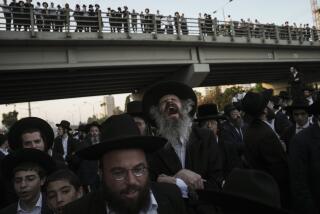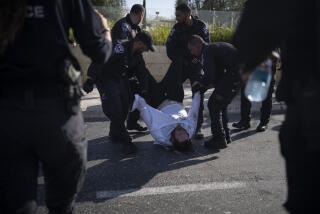Cultural Battles Fall Along a Religious Divide
- Share via
JERUSALEM — Aryeh Deri, leader of the religious Shas party, wears an elegant suit and silk tie with his black skullcap. He tamps down the tobacco in his pipe and inhales thoughtfully before addressing the difficult state of affairs between religious and secular Israelis.
The growing chasm, he says, is the result of a more secure and prosperous Israel. The country is no longer struggling for its survival, and so, quite naturally, internal differences rise to the surface.
“On the whole, my feeling is that the absolute majority of the people, excluding the extremists on both sides, wish to live in coexistence. I believe that the majority will prevail and find a common denominator,” Deri said.
This is the optimists’ view from an Orthodox rabbi who is considered one of Israel’s ablest politicians.
But Deri is precisely the kind of politician many secular Israelis dread most: smart, powerful and devout. He is a scholar of ancient Jewish law, halacha, who has mastered political maneuvering in a modern, Western-style democracy for what secular Israelis suspect are not necessarily democratic ends.
Shas is the third-largest party in parliament, and Deri is one of 23 members from religious parties that have become Israel’s kingmakers. Neither of the country’s larger parties, the left-of-center Labor and right-of-center Likud, has been able to garner a majority in the 120-seat Knesset to form a government alone, and each, in its time, has turned to Shas, the National Religious Party and United Torah Judaism to form a coalition.
Because no government can afford to alienate its religious partners, Israel’s secular majority is unable to pass laws opposed by the ultra-Orthodox minority. That makes lawmakers like Deri powerful beyond their numbers.
“Shas has 10 seats and represents that sector of society,” said Hirsh Goodman, a political commentator and editor of the English-language magazine Jerusalem Report. “The problem is that 10% is 100% because, as long as Labor and Likud don’t form a unity government, they’ve got all the coalitions by the beard.”
The coalitions also rely heavily on Deri. When then-Labor Prime Minister Yitzhak Rabin launched secret peace talks with the Palestinians in 1993, he made sure that Deri was on board.
Last month, Likud Prime Minister Benjamin Netanyahu called on Deri to convince the Clinton administration that the coalition government would never accept a U.S. plan for Israel to hand over 13% of the West Bank to the Palestinians.
With Deri’s support, Rabin got his peace deal and Netanyahu sent a U.S. negotiator packing.
This is not the role that Israel’s secular founding fathers had in mind for the religious 50 years ago.
Even then, relations between religious and secular Jews were marked by suspicion and disagreements. With a mutual conviction that the other would eventually fade away, they cut a deal for coexistence: Secular Israelis would mind the public and political realms--the army and government--while the ultra-Orthodox would look after private, religious affairs such as marriage, burial and conversion.
Far from becoming extinct, however, both groups grew in size and militancy.
“It’s easy to be tolerant of a dying person,” said Avi Ravitzky, professor of Jewish Thought at Hebrew University. “But in the last 10 years, everyone has become aware that the other is going to stay, have grandchildren and flourish. It is difficult to accept the real existence of the other side.”
Today, each side angrily accuses the other of having violated the unwritten social charter of the first years. The ultra-Orthodox have amassed political power, while secular politicians are trying to wrest marriage and conversions from the ultra-Orthodox.
The country’s secular majority argues, moreover, that while it is pushing for pluralism, the ultra-Orthodox, or haredim, are trying to impose their will on everyone.
Deri retorts: “The impression created by some of the media and the left that we have taken control of the country is false. This is cheap demagoguery verging on anti-Semitism.”
Deri works from a plush office dominated by a larger-than-life portrait of Shas spiritual leader Rabbi Ovadia Yosef. While the Shas leadership is ultra-Orthodox, a majority of its followers are not haredim but traditional Jews of Middle Eastern and North African descent. Many of them come from low-income families who feel left out of the political system founded by European-born Ashkenazi Jews and are suspicious of their Western-style democracy.
More a mass movement than a formal party, Shas received 260,000 votes in the 1996 parliamentary elections--up 100% from the previous vote, in 1992--and 40,000 children are enrolled in its religious schools. Tens of thousands more participate in Shas clubs, youth movements and other activities.
Deri faces legal charges of corruption for allegedly funneling about $250,000 to Shas party organizations while serving in the previous Labor-led government. Shas followers dismiss the case as persecution by the country’s elite against the religious and Sephardim. Deri has a slightly different view.
“There is no doubt that the state attorney has never invested so much effort, manpower and budget as it has against me and against Shas,” he said. “I don’t believe that this is a Sephardi-Ashkenazi issue. I do believe, however, that psychologically and subconsciously this is part of a kultur kampf.”
Many secular Israelis also call the conflict between religious and secular citizens a “culture war.” At stake is what kind of state Israel will become in the next 50 years: a Jewish state in which respect for the Sabbath is legislated and Jewish law adopted, or a live-and-let-live state of civil laws for all kinds of Jews and non-Jews.
These would seem to be mutually exclusive views: Stores may either open or close on the Sabbath, not both.
*
The battlefronts have been varied in recent months, with Tel Aviv approving a law allowing movie theaters and other entertainment centers to open on Saturdays, and the haredim demonstrating to close shopping centers on kibbutz-owned property that are now open on the Sabbath. In the northern town of Pardes Hanna, secular and religious Israelis have been engaged in a block-by-block battle for control of a suburban neighborhood.
Nationwide, neither religious nor secular Israelis want to live together, according to a poll published in the daily newspaper Yediot Aharonot earlier this year. Asked if they would buy an apartment in a building with a significant number of secular residents, 69% of the haredim said they would not. Among secular Israelis, 69% also rejected buying an apartment in a building with a significant number of haredi residents.
According to Deri, Shas voters want a state “whose leaders are proud of their Jewishness. They want Jewish culture, not mere Israeli or Western culture; they want their children to receive more Jewish education; they want the street and daily life to feel more Jewish. But they do not want a haredi or religious state.”
And what does Deri want?
“I draw a line between the private aspirations of a religious Jew who prays three times a day, studies the Torah and wants to live in a halachic state, and the reality,” he said. “It is impossible to live in a halachic state when the majority doesn’t want it. . . . If Israel happens to change so that a majority want it, then it would be democratic.”
More to Read
Sign up for Essential California
The most important California stories and recommendations in your inbox every morning.
You may occasionally receive promotional content from the Los Angeles Times.













